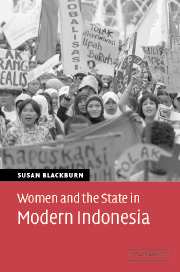Book contents
- Frontmatter
- Contents
- Acknowledgments
- Note on spelling and terminology
- Glossary: abbreviations, acronyms and Indonesian terms
- Introduction
- 1 State gender ideologies and the women's movement
- 2 Education
- 3 Early marriage
- 4 Citizenship
- 5 Polygamy
- 6 Motherhood
- 7 Economic exploitation
- 8 Violence
- Conclusion
- References
- Index
1 - State gender ideologies and the women's movement
Published online by Cambridge University Press: 22 September 2009
- Frontmatter
- Contents
- Acknowledgments
- Note on spelling and terminology
- Glossary: abbreviations, acronyms and Indonesian terms
- Introduction
- 1 State gender ideologies and the women's movement
- 2 Education
- 3 Early marriage
- 4 Citizenship
- 5 Polygamy
- 6 Motherhood
- 7 Economic exploitation
- 8 Violence
- Conclusion
- References
- Index
Summary
As a prelude to later thematically based chapters, this chapter examines the changing nature of the gender ideology of the Indonesian state during the twentieth century, and how it relates to the development of the women's movement. Some basic questions are raised about the influence of the state on that movement and about the extent to which the state reflects or seeks to change society's views of gender. Subsequent chapters will explore the ability of the movement itself to influence state gender ideology.
Gender ideology
Gender ideology spells out expectations of how men and women should behave according to their ascribed sex. In this book I use the term to refer to ideas about the construction of gender in Indonesia. Such ideas are being constantly contested from various quarters, because of the diversity of views about gender within and outside Indonesia.
In Indonesia, different ethnic groups have their own gender traditions. Some of the best known include the matrilineal system of West Sumatra (Minangkabau), where inheritance of property follows the female line: husbands are ‘guests’ in their wives' houses. Nevertheless, Minangkabau men still have their own power bases, since family and community decisions are formally made by male representatives of lineages – the brothers of female property-holders. By contrast, nearby Batak society in northern Sumatra is strongly patrilineal: women are unable to inherit and are economically dependent on men as well as excluded from public decision-making.
- Type
- Chapter
- Information
- Women and the State in Modern Indonesia , pp. 8 - 32Publisher: Cambridge University PressPrint publication year: 2004



